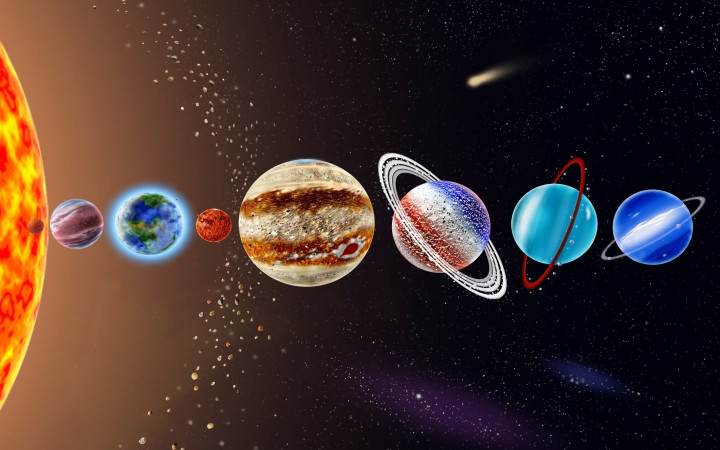Today’s Wonder of the Day was inspired by Lydia . Lydia Wonders, “Who named the planets?” Thanks for WONDERing with us, Lydia !
Do you ever look up at the night sky? Can you find the Big Dipper? How about Orion? If you look closely, you can see much more than stars at night. You’ll notice the Moon, of course (unless it’s a New Moon!). But you may also see comets or shooting stars. If you look in the right areas, you might even notice a few planets.
No telescope? No problem! The five planets closest to Earth can be seen with the naked eye. In fact, people have been staring up at Mercury, Venus, Mars, Jupiter, and Saturn for thousands of years.
Ancient Romans paid much attention to Earth’s neighbors. They noticed that each planet had different characteristics. They even mapped the planets' movements. That’s how the Romans gave the planets their names.
Have you ever heard of Roman mythology? It is a set of beliefs Romans held about the world. It included stories about the beginning of the world and about the actions of gods.
The Romans named the planets after their gods. Mercury, the closest planet to the Sun, has the shortest revolution. Since it appeared to move faster than the others, the Romans named it after the god that carried messages.
Venus shines brightest in the night sky. That’s why the Romans gave it the name of their goddess of love and beauty. Mars was named after the Roman god of war. That’s because of its color—it’s also called the Red Planet!
On the other side of the asteroid belt, Jupiter is the largest planet in the solar system. That’s why the Romans gave it the name of the king of their gods. They then named the ringed planet Saturn for Jupiter’s father.
These names stuck. And the practice of naming objects in the sky after stories from mythology caught on, too. When William Herschel discovered Uranus in 1781, he wanted to name it for the English king, George III. However, others decided to call it Uranus. The name came from Ouranos, the Greek god of the sky and father of Saturn.
Decades later, Johann Galle discovered the eighth planet. He wanted to name it for the astronomer Urbain Le Verrier. Instead, seeing the new planet’s blue tint, astronomers named it Neptune after the Roman god of the sea.
Back when there was a ninth planet, Pluto was named for the Roman god of the underworld. This was fitting. The former planet is the farthest world from the Sun. Today, Pluto is called a dwarf planet.
Who gets to name the planets now? An organization called the International Astronomical Union (IAU) has had that honor since 1919. However, most scientists believe they’ve found all the planets in this solar system. Today, the IAU focuses on naming newly found moons, surface features, asteroids, and comets.
Typically, the IAU sticks to the use of mythology for naming new heavenly objects. For example, the moons of Jupiter have the names of characters in the stories of Zeus, Jupiter’s Greek counterpart. The moons of Pluto are named for other characters that exist in the mythological underworld.
How about our Earth? You won’t find any Greek or Roman gods with that name! Instead, “Earth” came from Old English and Germanic words meaning “ground.” Pretty fitting, huh?
Would you like to help name the next rock found in space? You’re in luck! The IAU does take suggestions. So read up on your mythology and send your best ideas their way! What will you choose?
Standards: NGSS.ESS1.A, CCRA.L.3, CCRA.L.6, CCRA.R.1, CCRA.R.2, CCRA.W.2, CCRA.W.9, CCRA.L.1, CCRA.L.2, CCRA.R.10, CCRA.R.4, CCRA.W.1, CCRA.SL.1, CCRA.SL.2




